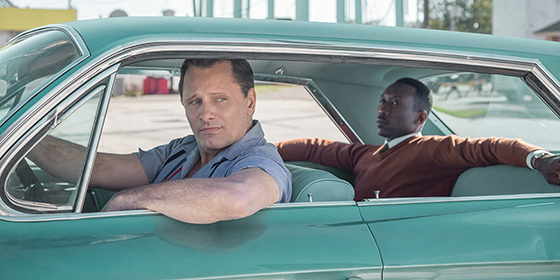Green Book

Viggo Mortenson and Mahershala Ali in GREEN BOOK. Photo courtesy TIFF.
It’s a distinctly uncomfortable feeling to have the audience around you burst into laughter at a character’s use of a racial slur, especially when it’s tossed out casually, like an afterthought. Perhaps that was the point GREEN BOOK was trying to make: that for Tony Lip (Viggo Mortensen), racism is so deeply ingrained that he isn’t even cognizant of it.
The problem is that when we first meet Tony, his racism isn’t just simmering beneath the surface. It is grotesquely overt. He throws out a set of glasses his wife (Linda Cardellini) used to serve lemonade to a pair of black repairmen, simply because their lips touched them. She sighs – long suffering – and carefully retrieves the discarded items, yet refuses to call out her wise-guy husband for his ignorance. Such is her lot in life, and this thankless Supportive Wife role.
GREEN BOOK doesn’t put in the work to establish why Tony’s dehumanizing behavior suddenly vanishes when he’s offered employment by “Doctor” Don Shirley (Mahershala Ali), a classically trained pianist. Is the prospect of steady work for two months all that it takes to make a dyed-in-the-wool racist suddenly see the light? There are very few difficult questions or answers to be found here. At its core, GREEN BOOK is as safe as they come, meting out serious social issues as easily-digestible bites, presented to its audience in a rose-colored haze.
Granted, tension simmers between the two characters – the remarkable chemistry and comedic timing displayed by both Ali and Mortensen makes the film – but it is more due to their completely opposing personality types. Fastidious, Shirley possesses a voracious appetite for the classics (whether it be literature or music), while Tony is pure salt of the earth. He lives large and loud, and eats just as passionately. Their evolving relationship is a delight to watch. Though on opposite extremes, both men are intensely likable and their warring personalities make for a breathless back-and-forth.
There are moments in GREEN BOOK that are surprisingly observant (Tony’s use of microaggressions: “I’m more black than you are!”), followed by clunky tone-deafness (apparently, cops above the Mason Dixon line will help you change a flat instead of beating and wrongfully arresting you). Only a handful of black speaking roles in the film exist outside of Shirley. While it serves to accentuate how far removed he is from his own culture, it still feels out-of-balance with the number of white supporting characters given more than just a handful of lines.
Shirley’s character is heartbreaking, experiencing moments of despondent isolation; he drinks heavily to escape this loneliness. The moment we are shown why (due to more than just the constant, exhausting racism he experiences) is both shocking and deeply affecting. Unfortunately, instead of adding conflict to the dynamic between the two men – and exploring the difficult conversation that would undoubtedly result – GREEN BOOK choses to sidestep the issue in a way that strains believability and counteracts its own thesis of Tony’s nature (and the hyper-masculine subculture that he was raised in).
In that vein, the overt racism of white people shown in the deep south varies from vulgar over-the-top to prim over-the-top, and seems to vanish altogether when the couple returns to the north, a concept of systemic evil so compartmentalized that it flies in the face of Tony’s (supposed) odyssey of racial enlightenment. GREEN BOOK isn’t anything more than a superficial glance at the deeply-rooted racism of America; at its heart, it is simply a road trip movie featuring a pair of disparate personalities. If that’s all that you require of it, you won’t be disappointed.